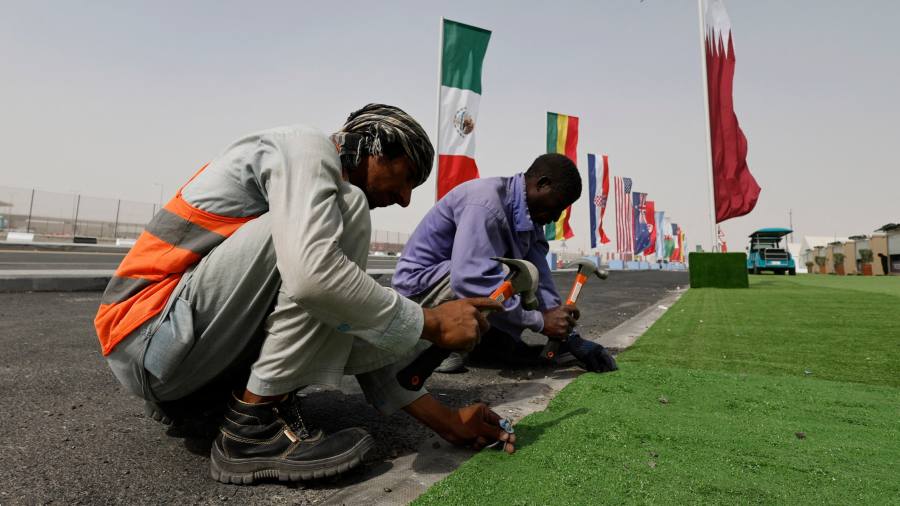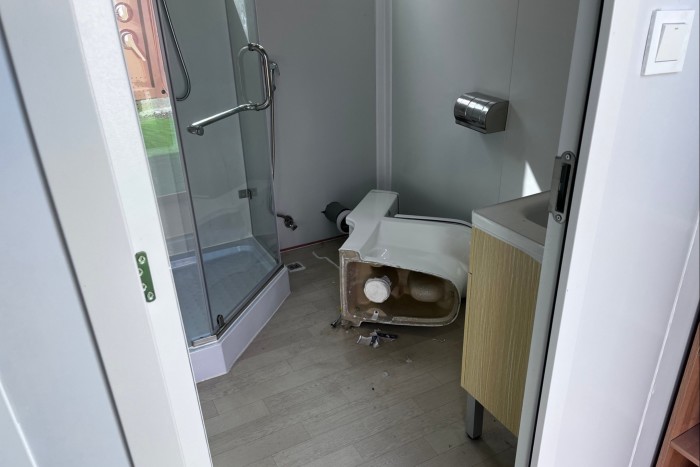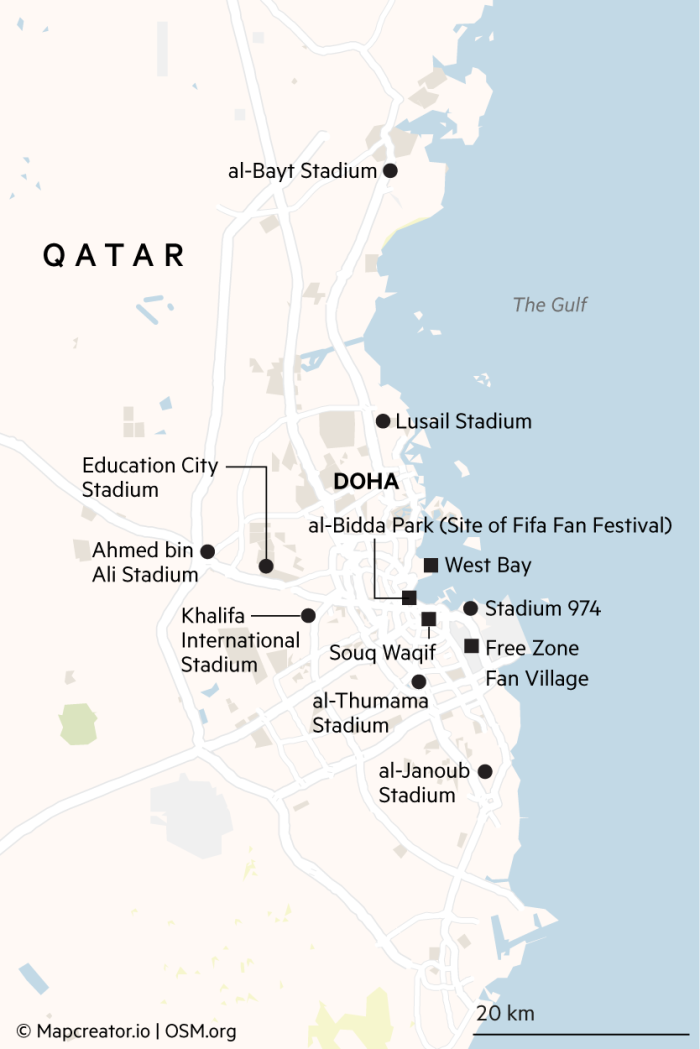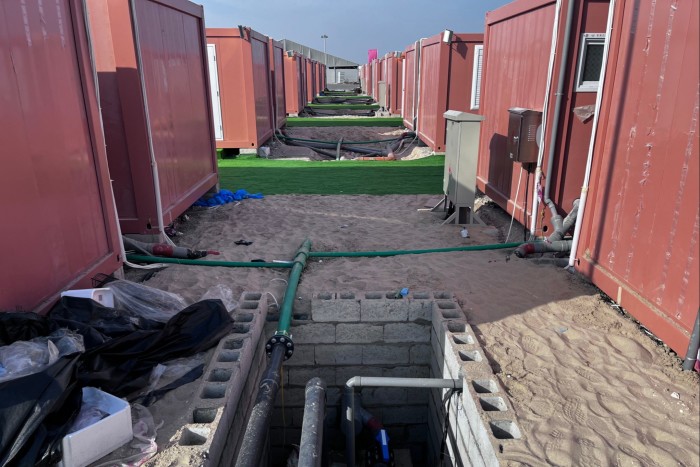
At the Free Zone Fan Village, in the desert south of Doha, construction workers from Bangladesh rush to complete the sprawling grid of 6,500 cabins under the glare of the searing midday sun.
The Free Zone is the biggest of three temporary bases housing a total of 20,000 fans in cabins that Qatar has built for the World Cup. Rooms start at $207 a night. Some facilities — including a supermarket, food huts and a miniature Starbucks — are open. Yet much of the venue is unfinished, a sign of the last-minute dash to be ready for the 1.5mn visitors expected in the small Gulf state of nearly 3mn people.
With 72 hours to go before the tournament kicks off, workers were still fitting toilets, building bedroom furniture and painting cabins. Each unit carries a banner with a message in English and Arabic; Welcome, Play, Now!; a few simply say: Cheer Up. But fan groups worry that the facilities will not be ready in time.
“There are still a lot of unanswered questions [such as] the state of the temporary accommodation,” said Ronan Evain, head of Football Supporters Europe. “I guess we’ll find out when the first guests arrive whether it’s ready.”
The zone is next to an old airport which has been reopened to handle daily shuttles to and from nearby places including Dubai and Bahrain. The further away from the metro station, the greater the distance to the finish line, with building materials still being ferried across dusty wasteland where huge silos storing gas — the source of the Gulf state’s immense wealth — loom on the horizon. Staff on site say work on the village is 90 per cent complete.
“As we approach kick off, Qatar is 100 per cent ready,” the country’s organising committee said when asked about unfinished building work. “Across all our sites and infrastructure, the final preparations are now complete.”

Fans will begin to land in Qatar in large numbers on Saturday, but early arrivals have bemoaned the high costs. Cafes in downtown Doha can charge more than $8 for a coffee. Soaring hotel prices have forced some into the desert cabins — the cheapest accommodation available.
It is not just budget rooms that remain unfinished. The New York Times reported on Friday that the hotel due to house Fifa’s top executives was not ready for guests, forcing them to stay elsewhere.
Another concern is the heat. Qatar has been suffering unusually hot weather, with temperatures hitting 32C by mid-morning. Nevertheless, reporters have been advised to bring scarves and hats to games, such is the blast from the air-conditioning units installed inside stadiums.

Although some of the stadiums are connected to Doha’s impressive new metro network, the walks from station to turnstiles at some grounds are as long as 2.5km. Others can only be reached by bus, with drop-off points for some described as a “minimum 35-minute walk”.
“I don’t know if this is even something that’s been tried before — to shuttle these massive crowds by bus. This is going to be a really, really big challenge,” said Evain.
Those driving in from the main airport will pass by two of the more peculiar World Cup sights. One is Stadium 974, named after the number of shipping containers used to construct it. Sitting 10km east of Doha, the temporary 40,000-seater stadium will host seven matches before being dismantled, stacked on to a ship and donated to an as yet undisclosed country in Africa.
Fans will also see vast cruise ships docked in the bay: two vessels with 4,000 luxury cabins are operational. A third arrived on Friday.

For those with somewhere to stay, the next question will be what to do between matches. At a test event on Wednesday, around 25,000 people flocked to the “Fifa Fan Festival” in Doha’s al-Bidda park. There was brisk demand for beer, supplied by World Cup sponsor Budweiser, despite the $14 price. The festival will be one of the only places fans can get alcohol outside luxury hotels, after organisers abruptly barred the sale of beer in fan zones at stadiums.
At the event, families of migrant workers — many from India, Bangladesh and Pakistan — wore the shirts of their favourite stars: Portugal’s Cristiano Ronaldo, Argentina’s Lionel Messi and Brazil’s Neymar. The latter’s image is ubiquitous, from banking adverts on the metro, to billboards promoting sim cards.
The stage, framed by the towering skyline of Doha’s West Bay, will host acts such as Calvin Harris and Sean Paul and screen all World Cup matches live. But the free event offered a glimpse of potential bottlenecks, with large queues of people waiting to pass through the tight security perimeter. The fan festival has capacity for 40,000 people — only a fifth of the visitors expected at peak times during the tournament.
The Corniche, a 6km stretch of waterfront filled with temporary shops and food stalls, can accommodate a further 120,000 people a day, while for the party crowd there are a series of large open-air raves in the desert finishing at 2am. The line-up combines world renowned DJs such as David Guetta and Gulf talent such as Saudi female DJ Cosmicat and Qatar’s own Deus Deserto.
At the Souq Waqif, fans can smoke shisha pipes, eat grilled meats and drink tea. Amid the bustle of the souk, made to look like an ancient bazaar but built in 2006, a group draped in Saudi Arabian flags offered themselves up for photos with fans from other countries.
Yet even sights such as these have generated doubts about their authenticity. Small groups of “Fan Leaders” have been flown in from each participating nation, while Qatar has been accused of employing people to boost the atmosphere. The organisers described any suggestions that fans were being paid to promote the tournament as “absolutely false”.
“A lot of these issues about it being boring and it being contrived will stick to the Qataris,” said Simon Chadwick, professor of sport and geopolitical economy at SKEMA Business School in Paris. “Fans will go and they’ll enjoy the football, drink beer and lounge in the sunshine, but a lot of people will think — this is not authentic.”